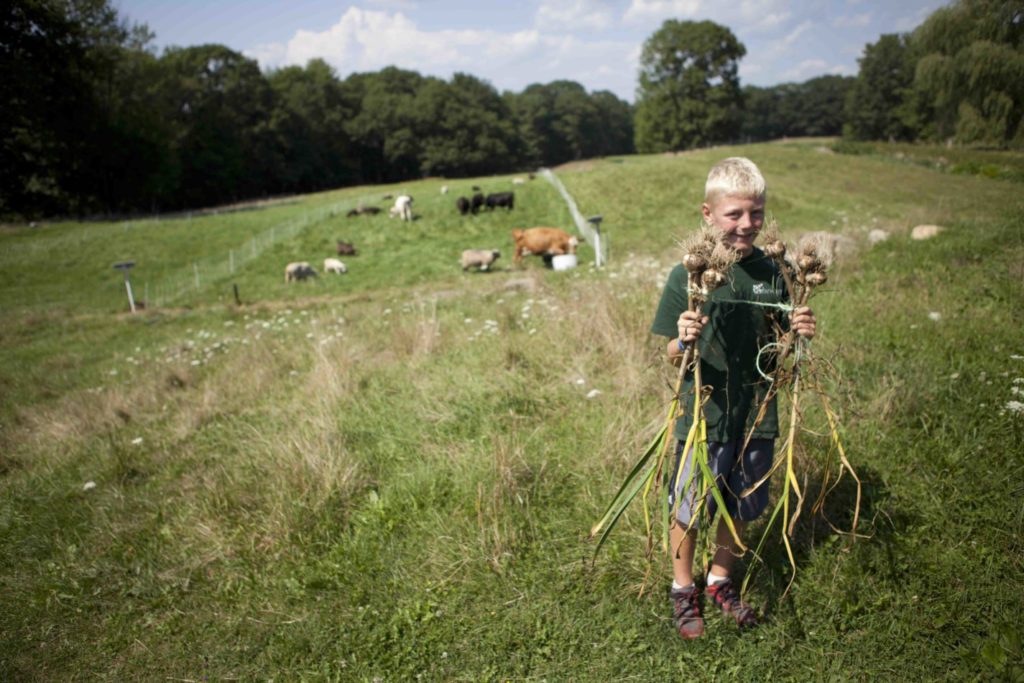Our Gardens
 Provider green beans, sugar snap peas, cross country cucumbers, young’s beauty pumpkins, nelson carrots, gilfeather turnips, tendersweet cabbage, sungold tomatoes, kennebec potatoes, ailsacraig onions . . . for folks who have spent time in Chewonki’s gardens, the vegetable names themselves are delicious reminders of morning harvests and afternoon weeding sessions, dirty knees and sweet conversations.
Provider green beans, sugar snap peas, cross country cucumbers, young’s beauty pumpkins, nelson carrots, gilfeather turnips, tendersweet cabbage, sungold tomatoes, kennebec potatoes, ailsacraig onions . . . for folks who have spent time in Chewonki’s gardens, the vegetable names themselves are delicious reminders of morning harvests and afternoon weeding sessions, dirty knees and sweet conversations.
The Chewonki farm includes one acre of diversified vegetables split into eight garden plots strategically situated to maximize the flattest pieces of earth on our hilly land. Managed using organic practices since the early 1990s, these gardens produce 10,000 to 15,000 pounds of vegetables annually under the care of farmers, students, and campers. All produce feeds staff and participants in Chewonki’s programs through the kitchen and Packout: the distance from garden to plate is mere steps. Our workhorse Sal is the central driving force behind the plowing, harrowing, cultivating, and covercropping that keep our gardens growing. We follow common organic practices such as crop rotation, cover cropping, fallowing, and feeding the soil with compost, which is made with all of the food waste from the dining hall and Packout.
To facilitate the use of garden produce, kitchen and farm staff (a.k.a. The Food Action Committee) meets each year in December to celebrate the most recent growing season and plan the next one: this conversation directly informs the garden plan and January seed order. February finds us seeding onions in the seeding room, the March sunshine warms up our two hoophouses sufficiently to support early spring green plantings, and April is – at last! – plowing time for Sal and crew. Throughout the summer, the farm crew harvests three times weekly, and the days after the fall’s first light frost finds us madly harvesting root crops like carrots and beets to pack away in the root cellar.
Farming is so much an intersection of practicality and reverence, and no place is this truer than during the growing season in the Chewonki gardens. As tenders of this land, we work long hours with oftentimes weary muscles, and satisfaction must come more often in the knowledge of a job well done than as a To Do list all checked off: the work is rarely finished during the growing season. We integrate young people into this work in ways that are developmentally appropriate and meaningful. Campers revel at the opportunity to harvest, wash, and nibble on carrots or taste test sour sorrel and licorice-spicy anise hyssop, semester students unearth parsnips as if discovering treasure, and Outdoor Classroom groups studiously peruse the whole of the gardens before deciding what vegetable to harvest for a stir fry dinner cooked over a fire. The work is real and relevant – sometime gooey, in the case of squishing potato beetles – but young people lean into it and reap benefits beyond well-balanced meals.






